(including the thematic tries, demanded for the Add-a-Year 65 JT)
-> go back to the Add-a-Piece Rules
Example 1
MK, original after Hilding Fröberg (Springaren, 1963)
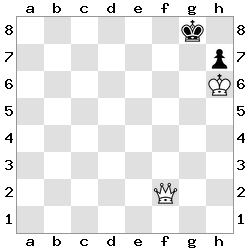
+wBa1: 1.Bh8!
Example 2
Anirudh Daga, original
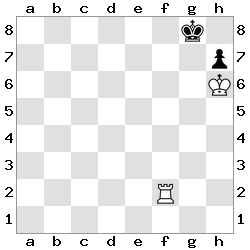
+wPg6: 1.gh7+!
Thematic try: +wBa1? (1.Bh8! 1.Rf6!)
Example 3 (*)
a) MK, original after Gerhard Kaiser (Jung-Roland-Rätsel, 1939)
b) MK, original
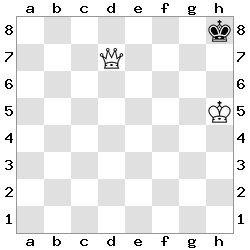
a) & b) twin-solutions
a) +wBe6: 1.Qd2!
Thematic tries:
+Sh6/+Se7? (1.Qg4! 1.Sf5!)
b) +wBf7: 1.Qg4!
(*) Jorma Paavilainen has found interesting “retro-cooks”: +wQg8/wRg8 0…Kxg8 1.Kg6!
This kind of retro tricks will not be allowed in Solving-Composing competition 14.05.22.
Please, note that twin-solutions as 3a) and 3b) will be allowed in the Add-a-Year quick composing tournament. My criteria for twin-solutions will be higher, asking for some kind of thematic relation between the twins, surely not as in 3a) & 3b, where 3b) is obviously a cook, much inferior to 3a.
Example 4. The task with given final position:
MK, original (cooked)
Initial position
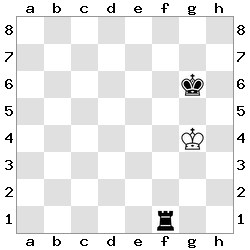
with given final position
Final position
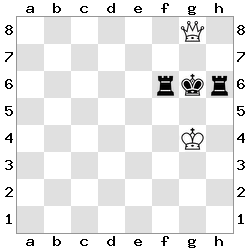
+wQh4, +bRf6: 1.Rh1 Qh8 2.Rh6 Qg8#
The intended additions (+wQh4, +bRf6) were reported by 18 out of 20 solvers. Only two solvers (Wouter van Rijn was the first one) found one out of two unintended additions: +wQf2, +bRf6 1.Rh1 Qa2! 2.Rh6 Qg8#
It’s interesting that no solver pointed the 3rd possibility: +wQe1, +bRf6 1.Rh1 Qe6! 2.Rh6 Qg8#
Both unintended additions could be avoided by moving position one file to the left:
Example 4, correction:
Initial position
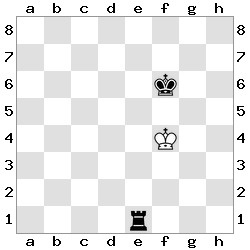
with given final position
Final position
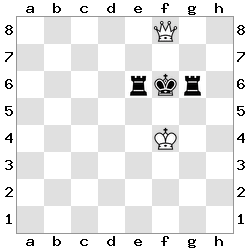
+wQg4, +bRe6: 1.Rg1 Qg8 2.Rg6 Qf8#
Try: +wQd1, +bRe6 (?) Apart from the solution with given mating position (1.Rg1 Qd6 2.Rg6 Qf8#), there is a unique cook (in the spirit of the refutation of the thematic tries, mentioned above): 1.Kg6 Qd8 2.Kh5 Qg5#
Example 5
Marjan Kovačević
The Hopper XII 2021
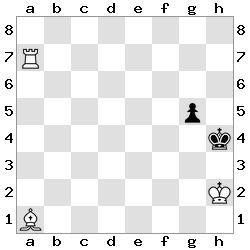
+bSg7: 1.Sh5 Rh7 2.g4 Bf6#
(set-play: 1…Ra5 2.g4 Bf6#)
Example 6
Marjan Kovačević
The Hopper XII 2021
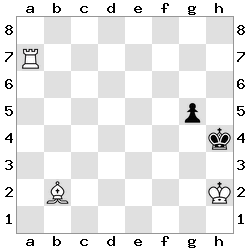
+bBc1: 1.g4 Bf6+ 2.Bg5 Rh7#
(set-play: 1…Bxc1 2.g4 Rh7#)
The twins 5 & 6 with set-play and pin-mates illustrate some of the posibilities to unite thematic contents of different solutions (unlike the twins 1 & 2). The seemingly small change (Ba1-b2) produce much bigger difference in the solutions than classic twins would do.
The type of twins presented in Examples 5 & 6 will be allowed in the Add-a-Year 65 JT .
Send your remarks, possible cooks and information about the time used for solving to: kovacevic.marjan@gmail.com.
